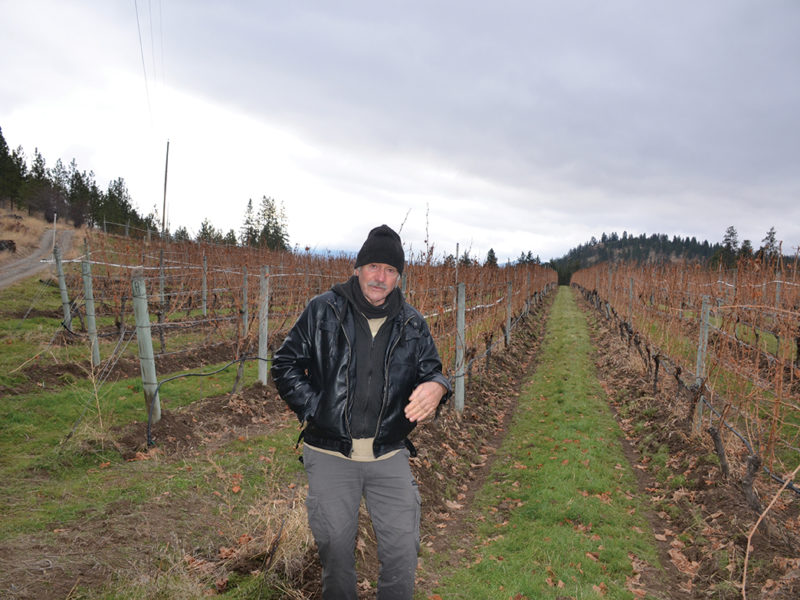OLIVER – When Hans Buchler and his wife bought the land for their 18 acres of vineyard almost 40 years ago, one of the attractions was the water.
“There is a good well on the property, which was important,” he says. “When I talked to the district of Oliver, they told me it would be difficult and expensive to pump water up here, and there still isn’t a purveyor connection up to this bench.”
The bench sits north of Oliver in the shadow of McIntyre Bluff. The sandy soil supports grape vines for Covert Farms, Andrew Peller Ltd. and Okanagan Crush Pad. Buchler’s own vines are nestled in small pockets among rocky cliffs. When you notice the dry grasses and the antelope and rabbit brush popping up between the rocks, it is hard to imagine cultivating any crop without water. Indeed, the surface water rights on the property extend back to 1898.
But in order to tap groundwater under the new licensing regime the province introduced in 2016, Buchler has to specify the crop he intends to irrigate. He feels that backs him into a corner.
“When I began discussing my application with FrontCounter, I was told that my licence has to be tied to the crop that I currently grow, my grapes,” he says.
He feels this ignores the historic uses of the property, which in the past has supported livestock, forage and vegetable production. By licensing to crop, as the practice is known, he says FrontCounterBC is unfairly constraining him.
“Wine is a luxury item,” he says. “With the realities of climate change and food security, we may need this land for growing vegetables. I’ve had livestock here in the past and have even grown forage.”
Jeff Nitychoruk, senior water stewardship officer for Okanagan-Shuswap with the BC Ministry of Forests, Lands, Natural Resource Operations and Rural Development, says groundwater allocations are tied to crop under section 30 of the Water Sustainability Act.
“If we were to issue a license that was designed for maximum allocation for forage, regardless of what was being grown, we would be setting people up for non-compliance of section 30,” he says.
Buchler filed his licence application three and a half years ago, in June 2017. The water use calculator the province provides applicants directed him to seek a licence for an annual allocation of 42,400 cubic metres for each of his two parcels. But that’s less than half the allocation he would need if he was growing apples.
FrontCounterBC says applicants can simply apply for a new groundwater licence if they change crops, but Buchler says it’s an expensive undertaking. Given the province’s duty to consult other stakeholders, he worries there wouldn’t be enough water to spare if he went back and asked for more.
“The amount of proof you would have to provide through environmental assessments and aquifer assessments would make it pretty much impossible for most farmers,” he says. “You are talking tens if not hundreds of thousands of dollars to have that type of assessment performed.”
Buchler believes that his surface water source, Park Rill Creek, is already over-allocated.
“I expect that I would be told that there was no more water volume available,” he says. “In very dry summers in the past, we have nearly run out of water.”
He also worries that a new license would jeopardize his first-in-time/first-in-right status.
Changing viticultural practices may also affect water demand. The growing adoption of organic practices in the Okanagan and Similkameen could see greater extractions to enhance cover crops and control emerging challenges such as red blotch virus.“There are several studies that are showing that doubling the amount of water for diseased vines helps control the virus for a time,” says Buchler.
Watering is cheaper than pulling up and replanting an entire vineyard with virus-free stock and waiting the three years before the vines are in full production. But the new groundwater regime isn’t flexible enough to accommodate such shifts, he contends.
“The people at FLNRORD who are administering the water licensing program seem to be completely out of touch with the needs of the farming community,” he says. “They have told us that our traditional water rights can be grandfathered in, which in my mind means that I would get to keep the volume of water that I now have.”
But that was never the intention of the legislation says Mike Wei, a consultant who was the province’s technical expert during development of the Water Sustainability Act and the Groundwater Protection Regulation.
“Grandfathering” is not a term found in the legislation, and staff are discouraged from using the word in explaining the licensing process to applicants, he says.
Buchler could appeal, but there is a catch.
“They have told me that I can appeal the allotment in my license, but of course I have to get the license first.”
With files from Peter Mitham


 Leasing farmland a vital strategy for farmers
Leasing farmland a vital strategy for farmers